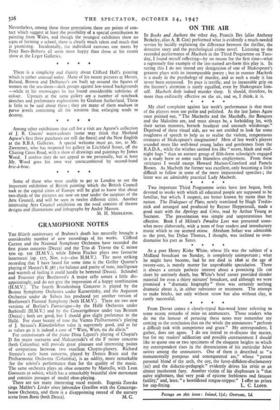ON THE AIR IN Books and Authors the other day,
Francis Iles (alias Anthony Berkeley, alias A. B. Cox) performed what is evidently a much-needed service by lucidly explaining the difference between the thriller, the detective story and the psychological crime novel. Listening to the recorded performance of Macbeth in the Third Programme on Tues- day, I found myself reflecting—by no means for the first time—what a supremely fine example of the last-named art-form this play is. In saying this I do pot intend any denigration of one of Shakespeare's greatest plays with its incomparable poetry ; but in essence Macbeth is a study in the psychology of murder, and as such a study it has never been surpassed. Its pace is terrific, and its inexorable grip on the listener's attention is rarely equalled, even by Shakespeare him- self. Macbeth doth indeed murder sleep. It should, therefore, be more than ordinarily effective on the air, and so, I think, it is.
* * * * My chief complaint against last week's performance is that most of the players were too polite and polished. As the late James Agate once pointed out, " The Macbeths and the Macduffs, the Banquos and the Malcolms are, and must always be, a forbidding lot, with their tartan manners, berserk headgear and uncouth whiskerage." Deprived of these visual aids, are we not entitled to look for some roughness of speech to help us to realise the violent, tempestuous creatures of Shakespeare's imagination? Most of last week's players sounded more like well-bred young ladies and gentlemen from the R.A.D.A., while the witches seemed less like " secret, black and mid- night hags " than an earnest group of fifth-form schoolgirls engaged in a study brew or some such blameless employment. From these strictures I would except Howard Marion-Crawford and Pamela Brown. As Macbeth the former was excellent, only becoming a little difficult to follow in some of the more impassioned speeches ; the latter was an admirably practical Lady Macbeth.
• * * *
Two important Third Programme series have just begun, both devoted to works with which all educated people are supposed to be familiar, but which, I suspect, are better known by name than by nature. The Dialogues of Plato, newly translated by Hugh Tredin- nick and arranged and produced by Rayner Heppenstall, made a good start with the Apology and Crito, read by Arthur Young as Socrates. The presentation was simple and unpretentious but effective. Book I of Milton's Paradise Lost was presented some- what more elaborately, with a team of four readers and introductory music which to me seemed otiose. Abraham Sofaer was admirable as the poet, but Dylan Thomas, I thought, was inclined to over- dramatise his part as Satan.
* * * *
As a poet Henry Kirke White, whose life was the subject of a Midland broadcast on Sunday, is completely unimportant ; what he might have become, had he not died in x8o6 at the age of twenty-one, is merely matter for unprofitable speculation. There is always a certain pathetic interest about a promising life cut short by untimely death, but White's brief career provided slender material for even a thirty minutes' broadcast, and although we were promised a " dramatic biography " there was certainly nothing dramatic about it, in either substance or treatment. The attempt to make bricks, not only without straw but also without clay, is
rarely successful. * * * *
From Dorset comes a closely-typed 800-word letter referring to some recent remarks of mine on annbuncers. Those readers who do me the honour of perusing these notes may remember my coming to the conclusion that on the whole the announcers " perform a difficult task with competence and grace." My correspondent, I gather, does not agree. I do not intend to re-discuss the matter, but for my readers' edification and possible entertainment I should like to quote one or two specimens of the eloquent heights to which my correspondent rises in the denunciation of his particular bites noires among the announcers. One of them is described as " a monumentally pompous and consequential ass," whose " patent personal blend of the arch, the coy, the fussy-diffident-disclatnatory (sic) and the didactic-pedagogic " evidently drives his critic to an almost incoherent fury. Another victim of his displeasure is "that naive nightmare, that very peak of epicene feebleness and fatuous futility," and, later, " a bewildered tongue-tripper." I offer no prizes
































 Previous page
Previous page